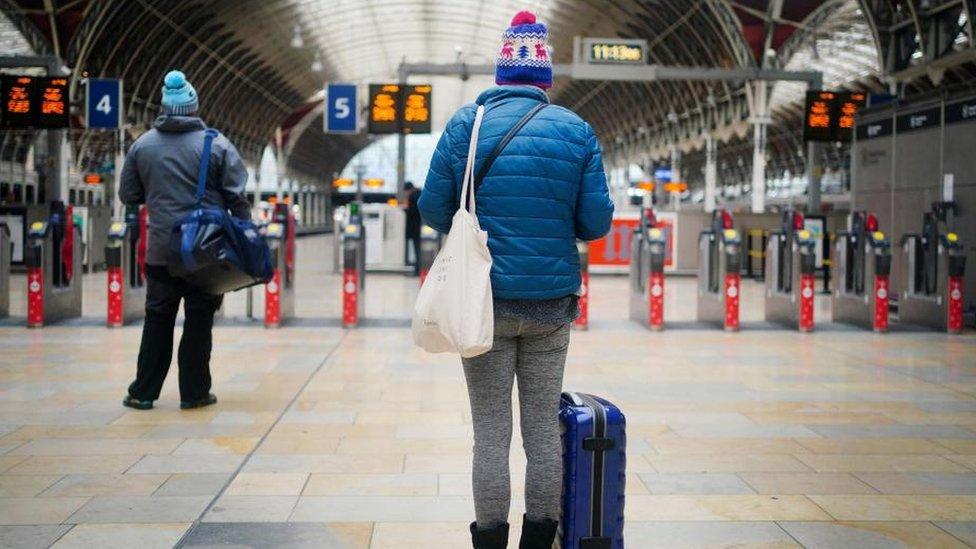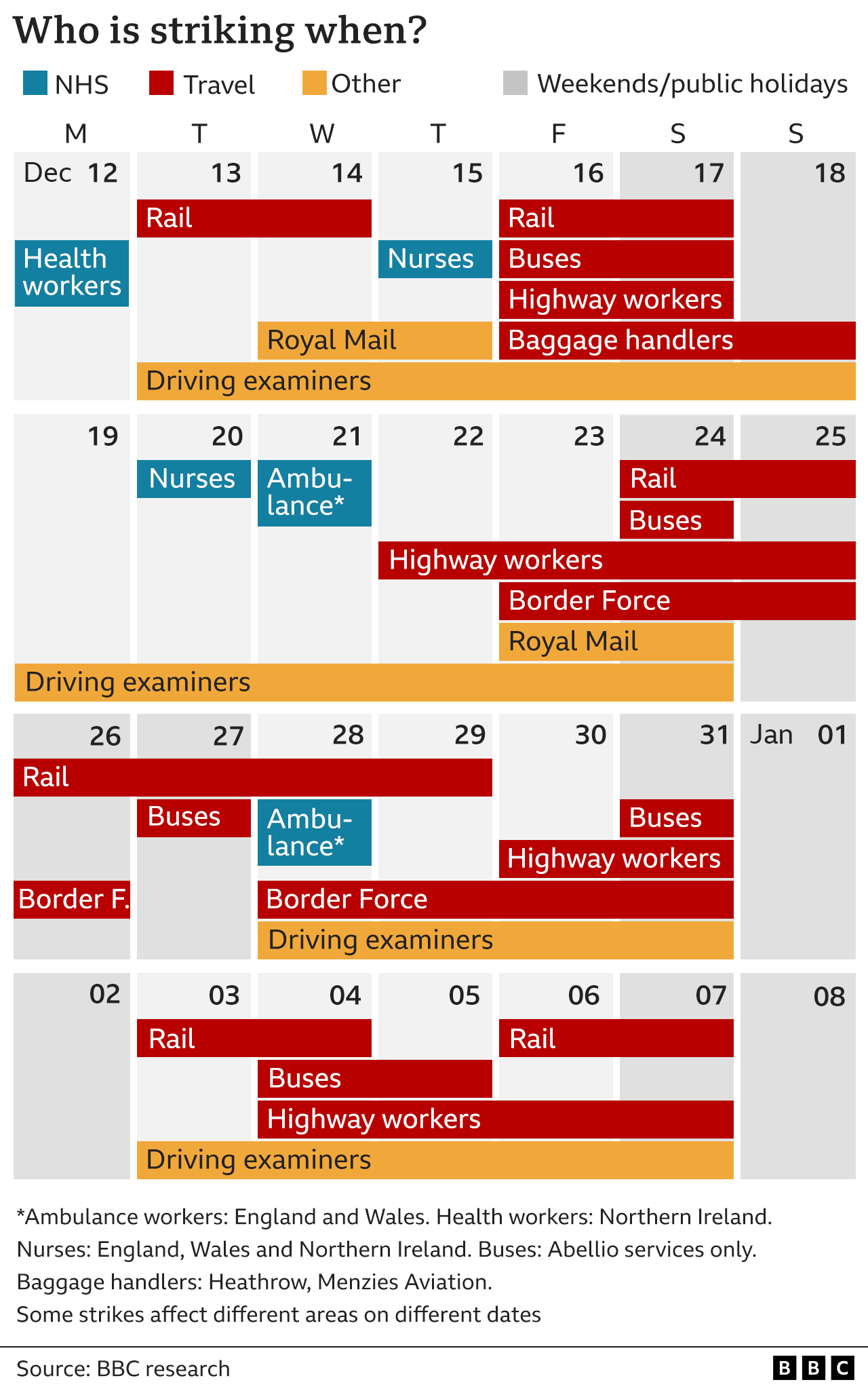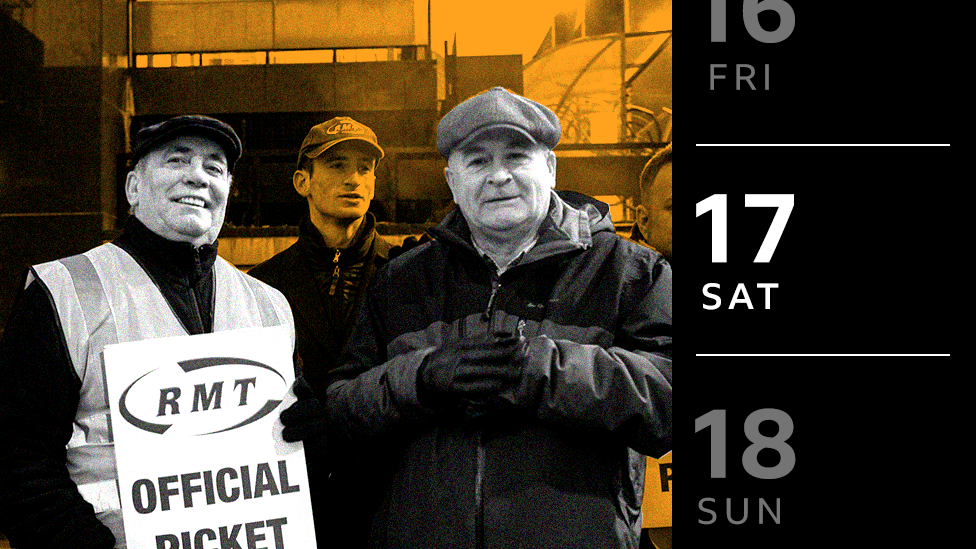Train strikes disrupting weekend before Christmas
- Published

Train passengers are facing further disruption on the last weekend before Christmas as rail workers continue strike action on Saturday.
Most services are affected as RMT union members stage the second day of their latest 48-hour walk out.
Network Rail has advised people not to travel on trains unless it is absolutely necessary.
The strikes come as shops and hospitality businesses look to boost trade in the key Christmas period.
Thousands of rail workers have already staged strikes on Tuesday, Wednesday and Friday this week as part of a long-running row over jobs, pay and conditions.
Saturday is the fourth day of strikes this week and the 12th since the RMT union voted for industrial action in the summer. Disruption is also likely on Sunday, a non-strike day, due to morning services starting later.
Mick Lynch, the general secretary of the RMT, the UK's largest rail union, said on Friday that both sides involved in the dispute needed to "work quickly" to end the strikes.
He said there had been "an exchange of views", but it was important that employers, ministers and unions were getting together.
The Rail Delivery Group, which represents train companies, said it was hopeful a resolution could be found between the parties, saying talks had been a "painstaking process", but "constructive".
The RMT is involved in two negotiating battles, one with Network Rail, where it represents around 20,000 signallers and maintenance workers, and the other with the Rail Delivery Group, where it represents a similar amount of workers at 14 train companies.
Rail workers have called for pay rises to match the rising cost of living and for better working conditions.
But rail bosses have said companies need to save money after the pandemic hit the industry hard and have argued reforms need to be agreed to afford pay increases and modernise the railway.
'Strikes rock-solid'
Mr Lynch praised members for showing "enormous dignity and rock-solid fortitude" after the strikes earlier this week.
"They have shown how important their work is to the functioning of the economy and wider society," he said.
Warnings of further snow and ice may bring more travel disruption, forecasters have warned.
The Met Office has issued yellow warnings for snow and ice in the majority of Scotland, Wales, and much of England for Sunday.
Severe weather in recent days has already led to difficult travel conditions with snow and ice affecting main roads and causing airport runway closures, leading to flight delays and cancellations.
The strikes by railway workers are among a wave of industrial action being carried out by various sectors.
Business Secretary Grant Shapps told Radio 4's Today that while he supported the right to strike "people should also have the right to go about their lives".
He said: "Some of the people most affected by strikes, particularly on the railways, are not people who can sit at home behind their computer but the hospital porter, the cleaner, who have to physically go to work."
He warned against a "1970s cycle" of strikes and inflation, adding industrial action is happening "because of Putin, because he invaded a country which pushed up energy prices, which pushed up inflation which has pushed up wage expectations to a point which, unfortunately if we were to pay it all we couldn't afford it. Putin has made us all a bit poorer I'm afraid".
Phil, a market trader in London, said this week was the "most important" one of the whole year.
"This is when we take our real proper money."
On Friday on Portobello Road "we probably had half the footfall that we'd normally have", he told the BBC.
Retail data company Springboard, which analyses footfall in shops, suggested the rail strikes on Monday and Tuesday had affected the number of people shopping on High Streets and other retail destinations.
From Monday to Wednesday, Springboard said footfall was 5.2% lower on all UK High Streets compared with the same days in 2021.
The company said footfall over those three days this week was 15.1% lower on High Streets than the same days last week.
Diane Wehrle, marketing and insights director at the company, said under normal circumstances footfall would have risen this week "as this is last full trading week before Christmas Day and so would be the peak shopping week, with footfall higher than last week".
She added that "clearly footfall is affected by a number of reasons", but highlighted a drop in footfall on the days of the strikes, particularly in central London.
Other impacts on footfall might include the colder weather, the rising cost of living or more people shopping online.
But Ms Wehrle said during the same week in the two years prior to the pandemic, footfall rose from the week before, by 10.2% in 2018 and by 7.2% in 2019.
The next RMT industrial action is scheduled from 18:00 GMT on Christmas Eve until 06:00 on 27 December, while members of the smaller TSSA union will walk out at three train companies between 26 and 29 December.
More RMT strikes are planned for early January.



How are you affected by the rail strike? Are you taking part in the strike action? You can email: haveyoursay@bbc.co.uk, external.
Please include a contact number if you are willing to speak to a BBC journalist. You can also get in touch in the following ways:
WhatsApp: +44 7756 165803, external
Tweet: @BBC_HaveYourSay, external
Or fill out the form below
Please read our terms & conditions and privacy policy
If you are reading this page and can't see the form you will need to visit the mobile version of the BBC website to submit your question or comment or you can email us at HaveYourSay@bbc.co.uk, external. Please include your name, age and location with any submission.
Related topics
- Published9 May 2024

- Published16 December 2022
